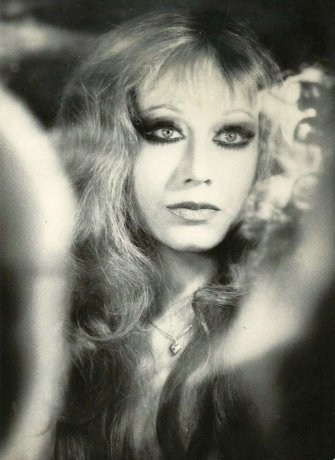Lydia Mancinelli
Lydia Mancinelli (Roma, 1936) è un'attrice di teatro e cinema. Debutta nel 1964 nell’Amleto di Shakespeare messo in scena da Carmelo Bene. Lo spettacolo rappresenta l’avvio del suo lungo sodalizio artistico e affettivo con questo protagonista della neoavanguardia teatrale italiana, durato quasi venti anni. Da allora, in qualità di attrice, oltre che di organizzatrice e collaboratrice, partecipa a quasi tutti gli spettacoli teatrali di Bene che ambivano al massacro lirico dei classici: Manon (1965), Faust o Margherita (1966), Il rosa e il nero (1966), Nostra Signora dei Turchi (1966), Arden of Ferverham (1968), S.A.D.E. ovvero libertinaggio e decadenza del complesso bandistico della Gendarmeria salentina (1974), Romeo & Giulietta (Storia di Shakespeare) secondo Carmelo Bene (1976), Riccardo III (da Shakespeare) secondo Carmelo Bene (1977), Otello o la deficienza della donna (1979), sempre al fianco dell'artista. Per il Teatro alla Scala, la Mancinelli ha interpretato Manfred (1981) di Byron-Schumann e Pinocchio (1982). E' protagonista anche dei principali lungometraggi di Bene: Nostra Signora dei Turchi (1968), Don Giovanni (1970), Salomè (1972), e Un Amleto di meno (1973). Donna solare e intelligente, la si è vista in ruoli impeccabili e lirici, come Santa Margherita in Nostra Signora dei Turchi o la fata/volpe in Pinocchio. Carmelo Bene raccontò Lydia Mancinelli come "una compagna elevata al cubo", elogiandola per le sue doti che "vanno ben al di là della semplice e stucchevole donna-amante". Nel tempo, la complessità del rapporto di questa coppia di inquieti sperimentatori off ("Non c’era una differenza tra pubblico e privato; non si smetteva mai di andare in scena") sembra trasparire anche nei ruoli teatrali che Carmelo le affida sino al Cassio governa Cipro per la radio, testo di Manganelli nel quale si recita l'Othello. Dopo la separazione da Bene nel 1983, prova a lavorare in teatro con Gabriele Lavia: "Il mio primo impatto con una compagnia ufficiale fu devastante. Con Carmelo era un continuo work in progress, e ogni replica era vissuta come se fosse un debutto." In seguito non ha voluto fare più nulla in teatro. Unica eccezione, per il Conservatorio Verdi di Milano ha messo in scena L’Arlésienne di Daudet (1987) con le musiche di Bizet, curandone traduzione, adattamento e regia. Nel 2020 è interprete vocale di MARTELLATE. SCRITTI FIGHI 1990-2020, raccolta di frammenti impulsivi scritti dall’artista visivo Marcello Maloberti, in mostra al MACRO di Roma,e pubblicata su disco per Xong, collezione di dischi d’artista (Xing,2021).
Lydia Mancinelli (Rome, 1936) is an italian theatre and film actress. She made her debut in 1964 in Shakespeare's Amleto staged by Carmelo Bene, an execeptional author-director-actor who innovated Italian avant-garde theatre and cinema in the ‘70s. The show represents the start of her artistic and sentimental companionship with Bene which lasted almost twenty years. Since then, she participated as an actress, as well as manager and collaborator, in almost all of his theatre performances, which aspired to the lyrical massacre of the classics: Manon (1965), Faust or Margherita (1966), Il rosa e il nero (1966), Our Lady of the Turks (1966), Arden of Ferverham (1968), S.A.D.E. or libertinage and decadence of the marching band of the Salento Gendarmerie (1974), Romeo & Juliet (from Shakespeare) according to Carmelo Bene (1976), Richard III (from Shakespeare) according to Carmelo Bene (1977), Othello or the deficiency of the woman (1979), always alongside the artist. For the Teatro alla Scala, Mancinelli played Manfred (1981) by Byron-Schumann and Pinocchio (1982). She was also the protagonist of Bene's main feature films: Nostra Signora dei Turchi (1968, controversial winner at Venice Film Biennial next to Alexander Kluge), Don Giovanni (1970), Salomè (1972), and Un Amleto di Meno (1973). She has been seen in roles such as Santa Margherita in Our Lady of the Turks or the Blue fairy/fox in Pinocchio. Carmelo Bene described Lydia Mancinelli as "a companion raised to the cube", praising her for her skills that "go far beyond the simple and cloying woman-lover". Over time, the complexity of the couple relationships between these two restless avant-gard artists became visibile in the roles that Carmelo entrusted to her up to Cassio governs Cyprus a text for the radio in which Othello is recited ("There was no difference between public and private; we never stopped being on stage"). After separating from Bene in 1983, she worked with the director Gabriele Lavia: "My first impact with an official theatre company was devastating. With Carmelo it was a continuous work in progress, and each show was experienced as if it were a debut." After that, she did not want to do anything else in theatre. The only exception was that for the Verdi Conservatory in Milan where she staged Daudet's L’Arlésienne (1987) with the music of Bizet, translating, adapting and directing it. Recently she read the 'written voices' of MARTELLATE (HAMMERINGS. COOL WRITINGS 1990-2020), a collection of impulsive fragments by the visual artist Marcello Maloberti, premiering at MACRO museum in Rome (2020), released as a record for the Xong collection (Xing, 2021).

